Organisational Behaviour: Sainsbury's Analysis Report
VerifiedAdded on 2023/01/06
|18
|5909
|55
Report
AI Summary
This report provides a comprehensive analysis of organisational behaviour, focusing on the case of Sainsbury's. It examines the influence of culture, power, and politics on individual and team performance, highlighting how these factors impact behaviour within the workplace. The report delves into motivational theories, including content and process theories, and assesses their application in achieving organisational goals. It also explores the characteristics of effective and ineffective teams, analysing team development theories to support cooperation and improve business performance and productivity. Furthermore, the report applies concepts and philosophies of organisational behaviour to a given business situation, evaluating how these concepts inform and influence behaviour. Overall, the report offers a detailed examination of the complexities of organisational behaviour within a real-world business context, providing insights into strategies for enhancing performance and fostering a positive work environment.
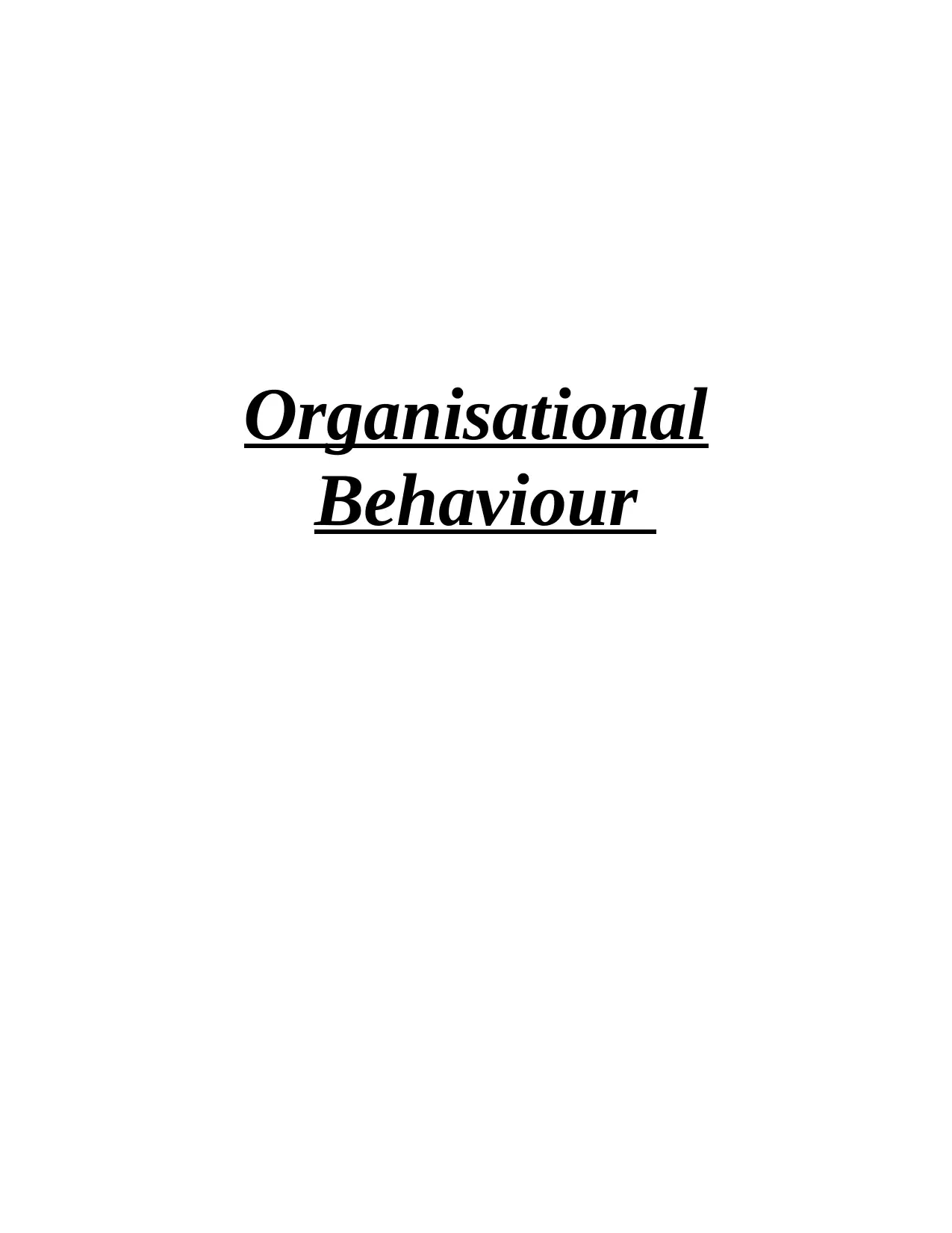
Organisational
Behaviour
Behaviour
Paraphrase This Document
Need a fresh take? Get an instant paraphrase of this document with our AI Paraphraser
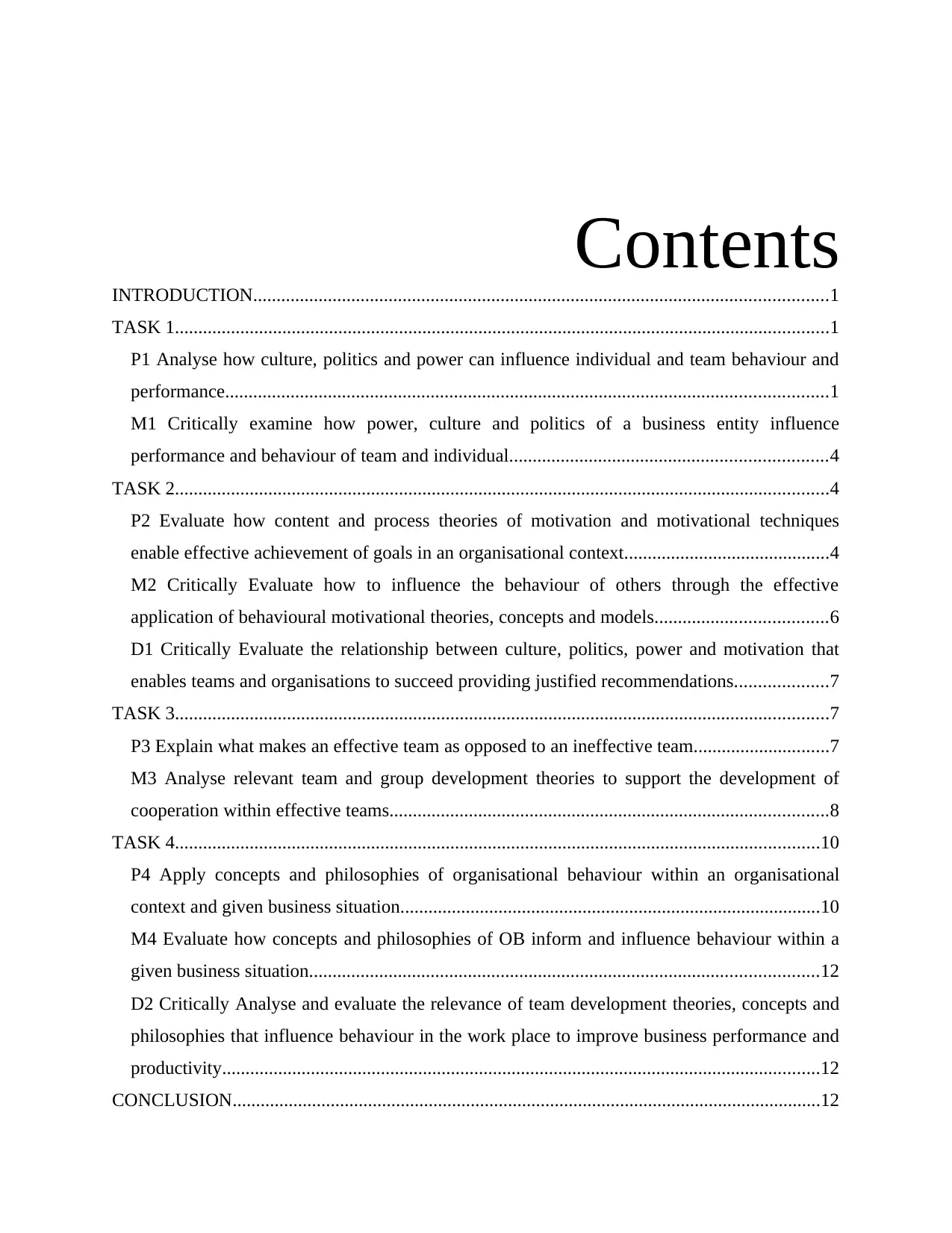
ContentsINTRODUCTION...........................................................................................................................1
TASK 1............................................................................................................................................1
P1 Analyse how culture, politics and power can influence individual and team behaviour and
performance.................................................................................................................................1
M1 Critically examine how power, culture and politics of a business entity influence
performance and behaviour of team and individual....................................................................4
TASK 2............................................................................................................................................4
P2 Evaluate how content and process theories of motivation and motivational techniques
enable effective achievement of goals in an organisational context............................................4
M2 Critically Evaluate how to influence the behaviour of others through the effective
application of behavioural motivational theories, concepts and models.....................................6
D1 Critically Evaluate the relationship between culture, politics, power and motivation that
enables teams and organisations to succeed providing justified recommendations....................7
TASK 3............................................................................................................................................7
P3 Explain what makes an effective team as opposed to an ineffective team.............................7
M3 Analyse relevant team and group development theories to support the development of
cooperation within effective teams..............................................................................................8
TASK 4..........................................................................................................................................10
P4 Apply concepts and philosophies of organisational behaviour within an organisational
context and given business situation..........................................................................................10
M4 Evaluate how concepts and philosophies of OB inform and influence behaviour within a
given business situation.............................................................................................................12
D2 Critically Analyse and evaluate the relevance of team development theories, concepts and
philosophies that influence behaviour in the work place to improve business performance and
productivity................................................................................................................................12
CONCLUSION..............................................................................................................................12
TASK 1............................................................................................................................................1
P1 Analyse how culture, politics and power can influence individual and team behaviour and
performance.................................................................................................................................1
M1 Critically examine how power, culture and politics of a business entity influence
performance and behaviour of team and individual....................................................................4
TASK 2............................................................................................................................................4
P2 Evaluate how content and process theories of motivation and motivational techniques
enable effective achievement of goals in an organisational context............................................4
M2 Critically Evaluate how to influence the behaviour of others through the effective
application of behavioural motivational theories, concepts and models.....................................6
D1 Critically Evaluate the relationship between culture, politics, power and motivation that
enables teams and organisations to succeed providing justified recommendations....................7
TASK 3............................................................................................................................................7
P3 Explain what makes an effective team as opposed to an ineffective team.............................7
M3 Analyse relevant team and group development theories to support the development of
cooperation within effective teams..............................................................................................8
TASK 4..........................................................................................................................................10
P4 Apply concepts and philosophies of organisational behaviour within an organisational
context and given business situation..........................................................................................10
M4 Evaluate how concepts and philosophies of OB inform and influence behaviour within a
given business situation.............................................................................................................12
D2 Critically Analyse and evaluate the relevance of team development theories, concepts and
philosophies that influence behaviour in the work place to improve business performance and
productivity................................................................................................................................12
CONCLUSION..............................................................................................................................12

REFERENCES..............................................................................................................................13
⊘ This is a preview!⊘
Do you want full access?
Subscribe today to unlock all pages.

Trusted by 1+ million students worldwide
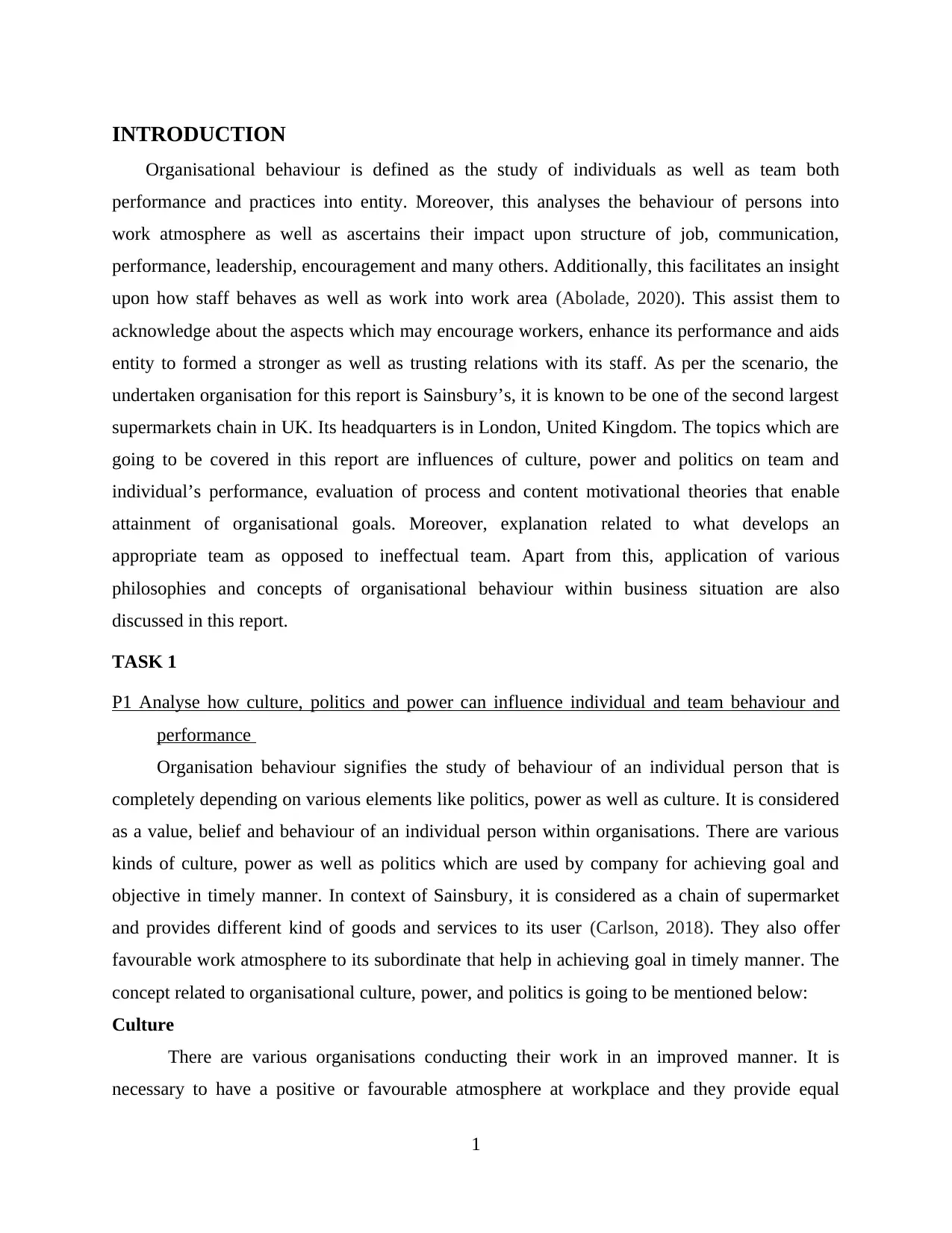
INTRODUCTION
Organisational behaviour is defined as the study of individuals as well as team both
performance and practices into entity. Moreover, this analyses the behaviour of persons into
work atmosphere as well as ascertains their impact upon structure of job, communication,
performance, leadership, encouragement and many others. Additionally, this facilitates an insight
upon how staff behaves as well as work into work area (Abolade, 2020). This assist them to
acknowledge about the aspects which may encourage workers, enhance its performance and aids
entity to formed a stronger as well as trusting relations with its staff. As per the scenario, the
undertaken organisation for this report is Sainsbury’s, it is known to be one of the second largest
supermarkets chain in UK. Its headquarters is in London, United Kingdom. The topics which are
going to be covered in this report are influences of culture, power and politics on team and
individual’s performance, evaluation of process and content motivational theories that enable
attainment of organisational goals. Moreover, explanation related to what develops an
appropriate team as opposed to ineffectual team. Apart from this, application of various
philosophies and concepts of organisational behaviour within business situation are also
discussed in this report.
TASK 1
P1 Analyse how culture, politics and power can influence individual and team behaviour and
performance
Organisation behaviour signifies the study of behaviour of an individual person that is
completely depending on various elements like politics, power as well as culture. It is considered
as a value, belief and behaviour of an individual person within organisations. There are various
kinds of culture, power as well as politics which are used by company for achieving goal and
objective in timely manner. In context of Sainsbury, it is considered as a chain of supermarket
and provides different kind of goods and services to its user (Carlson, 2018). They also offer
favourable work atmosphere to its subordinate that help in achieving goal in timely manner. The
concept related to organisational culture, power, and politics is going to be mentioned below:
Culture
There are various organisations conducting their work in an improved manner. It is
necessary to have a positive or favourable atmosphere at workplace and they provide equal
1
Organisational behaviour is defined as the study of individuals as well as team both
performance and practices into entity. Moreover, this analyses the behaviour of persons into
work atmosphere as well as ascertains their impact upon structure of job, communication,
performance, leadership, encouragement and many others. Additionally, this facilitates an insight
upon how staff behaves as well as work into work area (Abolade, 2020). This assist them to
acknowledge about the aspects which may encourage workers, enhance its performance and aids
entity to formed a stronger as well as trusting relations with its staff. As per the scenario, the
undertaken organisation for this report is Sainsbury’s, it is known to be one of the second largest
supermarkets chain in UK. Its headquarters is in London, United Kingdom. The topics which are
going to be covered in this report are influences of culture, power and politics on team and
individual’s performance, evaluation of process and content motivational theories that enable
attainment of organisational goals. Moreover, explanation related to what develops an
appropriate team as opposed to ineffectual team. Apart from this, application of various
philosophies and concepts of organisational behaviour within business situation are also
discussed in this report.
TASK 1
P1 Analyse how culture, politics and power can influence individual and team behaviour and
performance
Organisation behaviour signifies the study of behaviour of an individual person that is
completely depending on various elements like politics, power as well as culture. It is considered
as a value, belief and behaviour of an individual person within organisations. There are various
kinds of culture, power as well as politics which are used by company for achieving goal and
objective in timely manner. In context of Sainsbury, it is considered as a chain of supermarket
and provides different kind of goods and services to its user (Carlson, 2018). They also offer
favourable work atmosphere to its subordinate that help in achieving goal in timely manner. The
concept related to organisational culture, power, and politics is going to be mentioned below:
Culture
There are various organisations conducting their work in an improved manner. It is
necessary to have a positive or favourable atmosphere at workplace and they provide equal
1
Paraphrase This Document
Need a fresh take? Get an instant paraphrase of this document with our AI Paraphraser
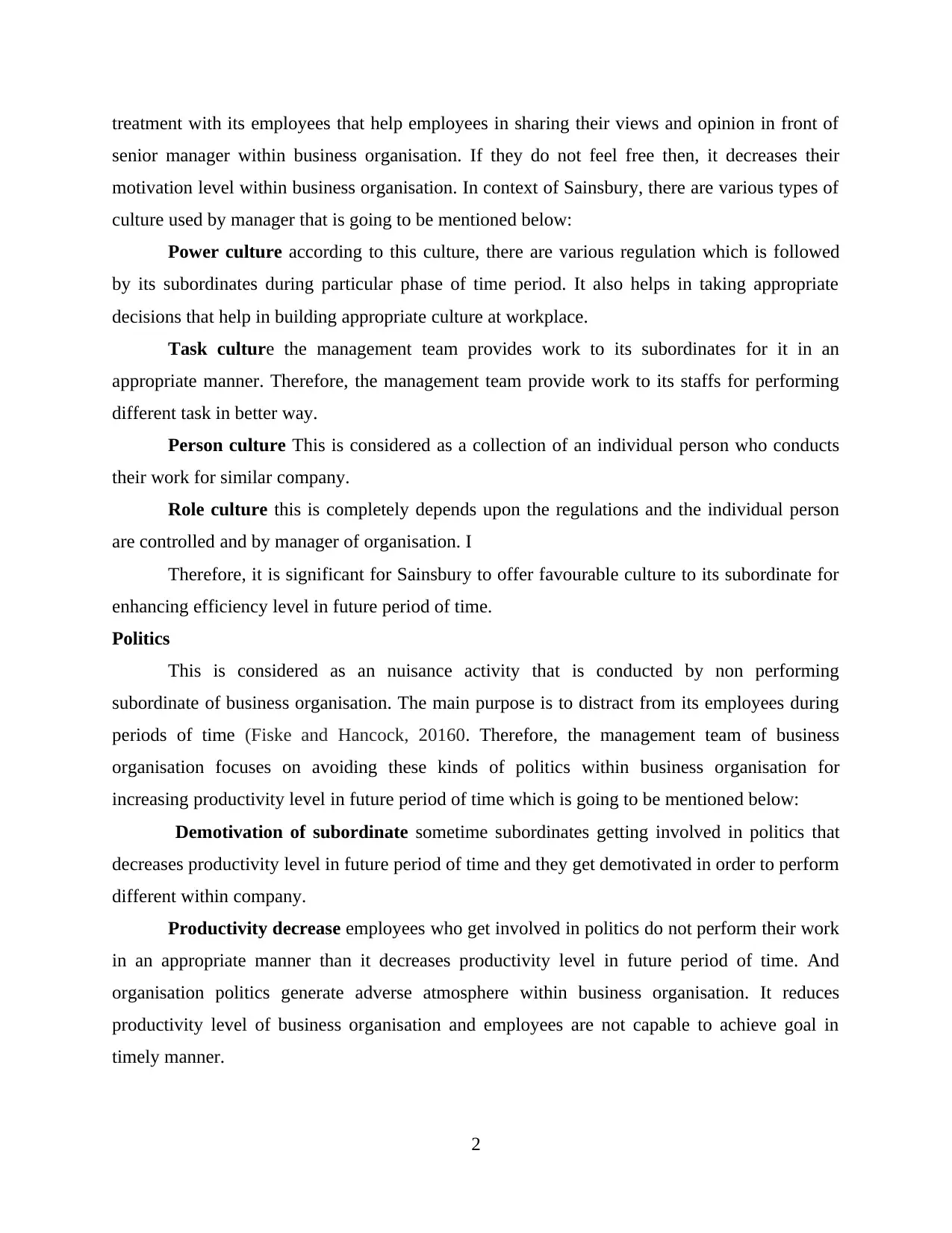
treatment with its employees that help employees in sharing their views and opinion in front of
senior manager within business organisation. If they do not feel free then, it decreases their
motivation level within business organisation. In context of Sainsbury, there are various types of
culture used by manager that is going to be mentioned below:
Power culture according to this culture, there are various regulation which is followed
by its subordinates during particular phase of time period. It also helps in taking appropriate
decisions that help in building appropriate culture at workplace.
Task culture the management team provides work to its subordinates for it in an
appropriate manner. Therefore, the management team provide work to its staffs for performing
different task in better way.
Person culture This is considered as a collection of an individual person who conducts
their work for similar company.
Role culture this is completely depends upon the regulations and the individual person
are controlled and by manager of organisation. I
Therefore, it is significant for Sainsbury to offer favourable culture to its subordinate for
enhancing efficiency level in future period of time.
Politics
This is considered as an nuisance activity that is conducted by non performing
subordinate of business organisation. The main purpose is to distract from its employees during
periods of time (Fiske and Hancock, 20160. Therefore, the management team of business
organisation focuses on avoiding these kinds of politics within business organisation for
increasing productivity level in future period of time which is going to be mentioned below:
Demotivation of subordinate sometime subordinates getting involved in politics that
decreases productivity level in future period of time and they get demotivated in order to perform
different within company.
Productivity decrease employees who get involved in politics do not perform their work
in an appropriate manner than it decreases productivity level in future period of time. And
organisation politics generate adverse atmosphere within business organisation. It reduces
productivity level of business organisation and employees are not capable to achieve goal in
timely manner.
2
senior manager within business organisation. If they do not feel free then, it decreases their
motivation level within business organisation. In context of Sainsbury, there are various types of
culture used by manager that is going to be mentioned below:
Power culture according to this culture, there are various regulation which is followed
by its subordinates during particular phase of time period. It also helps in taking appropriate
decisions that help in building appropriate culture at workplace.
Task culture the management team provides work to its subordinates for it in an
appropriate manner. Therefore, the management team provide work to its staffs for performing
different task in better way.
Person culture This is considered as a collection of an individual person who conducts
their work for similar company.
Role culture this is completely depends upon the regulations and the individual person
are controlled and by manager of organisation. I
Therefore, it is significant for Sainsbury to offer favourable culture to its subordinate for
enhancing efficiency level in future period of time.
Politics
This is considered as an nuisance activity that is conducted by non performing
subordinate of business organisation. The main purpose is to distract from its employees during
periods of time (Fiske and Hancock, 20160. Therefore, the management team of business
organisation focuses on avoiding these kinds of politics within business organisation for
increasing productivity level in future period of time which is going to be mentioned below:
Demotivation of subordinate sometime subordinates getting involved in politics that
decreases productivity level in future period of time and they get demotivated in order to perform
different within company.
Productivity decrease employees who get involved in politics do not perform their work
in an appropriate manner than it decreases productivity level in future period of time. And
organisation politics generate adverse atmosphere within business organisation. It reduces
productivity level of business organisation and employees are not capable to achieve goal in
timely manner.
2
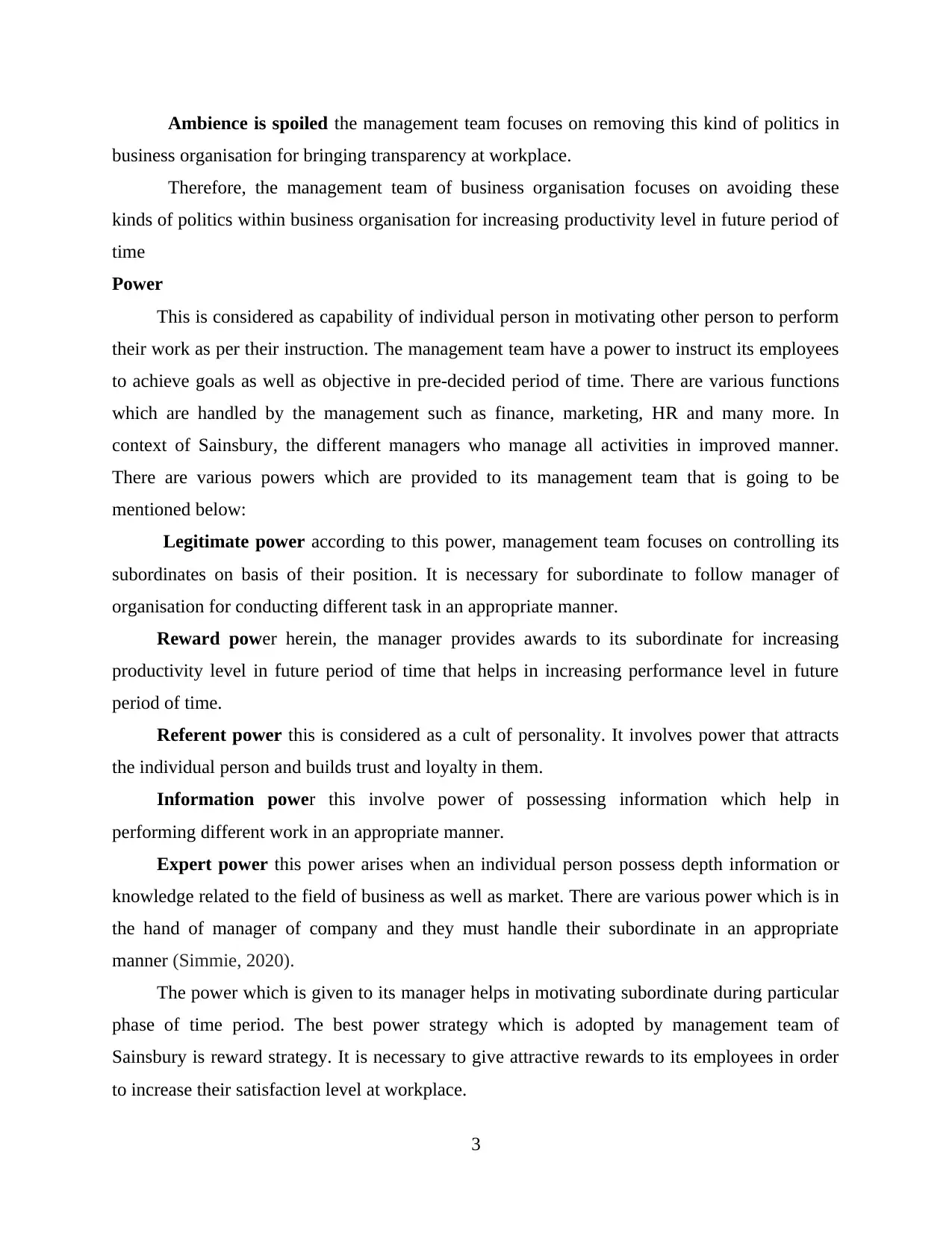
Ambience is spoiled the management team focuses on removing this kind of politics in
business organisation for bringing transparency at workplace.
Therefore, the management team of business organisation focuses on avoiding these
kinds of politics within business organisation for increasing productivity level in future period of
time
Power
This is considered as capability of individual person in motivating other person to perform
their work as per their instruction. The management team have a power to instruct its employees
to achieve goals as well as objective in pre-decided period of time. There are various functions
which are handled by the management such as finance, marketing, HR and many more. In
context of Sainsbury, the different managers who manage all activities in improved manner.
There are various powers which are provided to its management team that is going to be
mentioned below:
Legitimate power according to this power, management team focuses on controlling its
subordinates on basis of their position. It is necessary for subordinate to follow manager of
organisation for conducting different task in an appropriate manner.
Reward power herein, the manager provides awards to its subordinate for increasing
productivity level in future period of time that helps in increasing performance level in future
period of time.
Referent power this is considered as a cult of personality. It involves power that attracts
the individual person and builds trust and loyalty in them.
Information power this involve power of possessing information which help in
performing different work in an appropriate manner.
Expert power this power arises when an individual person possess depth information or
knowledge related to the field of business as well as market. There are various power which is in
the hand of manager of company and they must handle their subordinate in an appropriate
manner (Simmie, 2020).
The power which is given to its manager helps in motivating subordinate during particular
phase of time period. The best power strategy which is adopted by management team of
Sainsbury is reward strategy. It is necessary to give attractive rewards to its employees in order
to increase their satisfaction level at workplace.
3
business organisation for bringing transparency at workplace.
Therefore, the management team of business organisation focuses on avoiding these
kinds of politics within business organisation for increasing productivity level in future period of
time
Power
This is considered as capability of individual person in motivating other person to perform
their work as per their instruction. The management team have a power to instruct its employees
to achieve goals as well as objective in pre-decided period of time. There are various functions
which are handled by the management such as finance, marketing, HR and many more. In
context of Sainsbury, the different managers who manage all activities in improved manner.
There are various powers which are provided to its management team that is going to be
mentioned below:
Legitimate power according to this power, management team focuses on controlling its
subordinates on basis of their position. It is necessary for subordinate to follow manager of
organisation for conducting different task in an appropriate manner.
Reward power herein, the manager provides awards to its subordinate for increasing
productivity level in future period of time that helps in increasing performance level in future
period of time.
Referent power this is considered as a cult of personality. It involves power that attracts
the individual person and builds trust and loyalty in them.
Information power this involve power of possessing information which help in
performing different work in an appropriate manner.
Expert power this power arises when an individual person possess depth information or
knowledge related to the field of business as well as market. There are various power which is in
the hand of manager of company and they must handle their subordinate in an appropriate
manner (Simmie, 2020).
The power which is given to its manager helps in motivating subordinate during particular
phase of time period. The best power strategy which is adopted by management team of
Sainsbury is reward strategy. It is necessary to give attractive rewards to its employees in order
to increase their satisfaction level at workplace.
3
⊘ This is a preview!⊘
Do you want full access?
Subscribe today to unlock all pages.

Trusted by 1+ million students worldwide
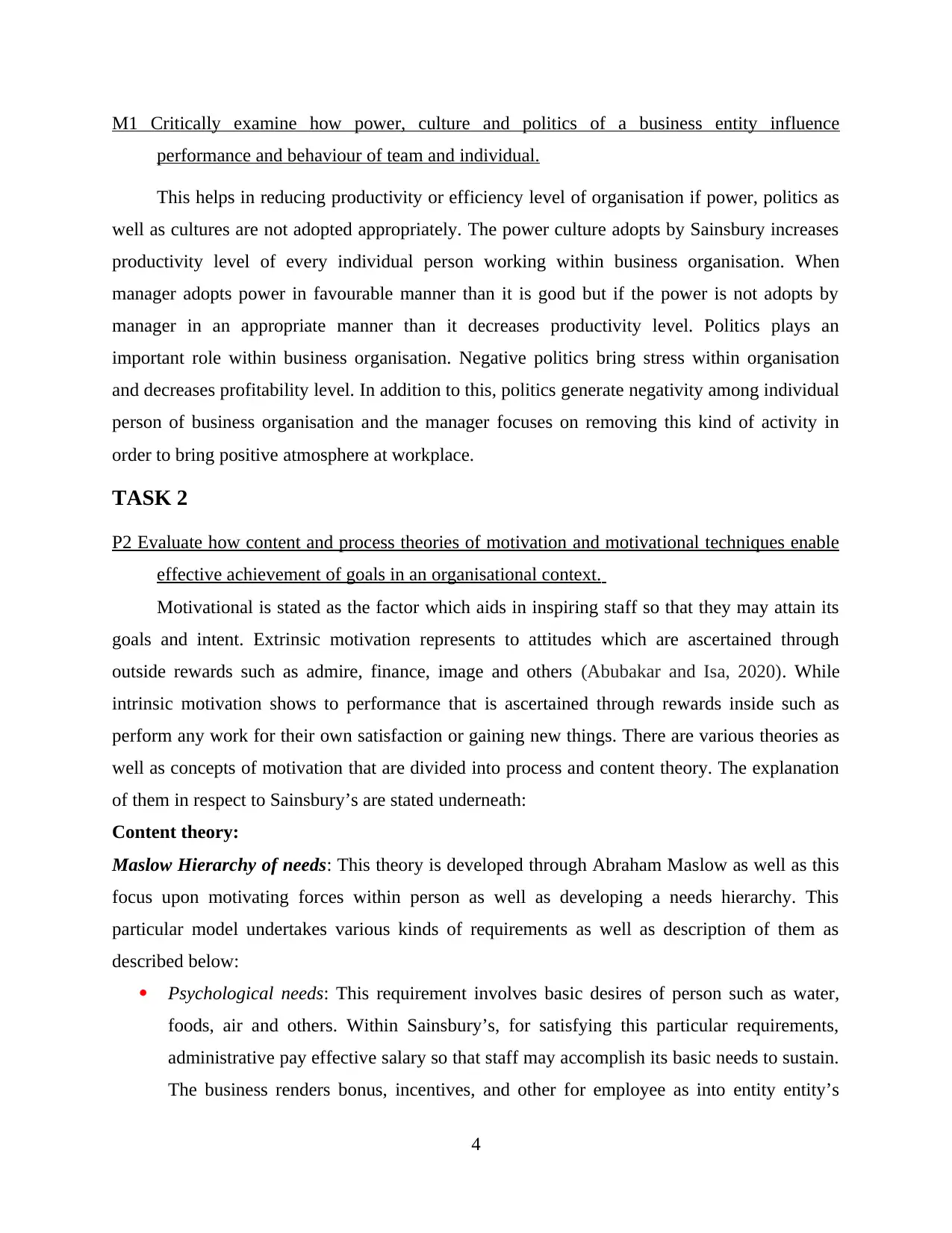
M1 Critically examine how power, culture and politics of a business entity influence
performance and behaviour of team and individual.
This helps in reducing productivity or efficiency level of organisation if power, politics as
well as cultures are not adopted appropriately. The power culture adopts by Sainsbury increases
productivity level of every individual person working within business organisation. When
manager adopts power in favourable manner than it is good but if the power is not adopts by
manager in an appropriate manner than it decreases productivity level. Politics plays an
important role within business organisation. Negative politics bring stress within organisation
and decreases profitability level. In addition to this, politics generate negativity among individual
person of business organisation and the manager focuses on removing this kind of activity in
order to bring positive atmosphere at workplace.
TASK 2
P2 Evaluate how content and process theories of motivation and motivational techniques enable
effective achievement of goals in an organisational context.
Motivational is stated as the factor which aids in inspiring staff so that they may attain its
goals and intent. Extrinsic motivation represents to attitudes which are ascertained through
outside rewards such as admire, finance, image and others (Abubakar and Isa, 2020). While
intrinsic motivation shows to performance that is ascertained through rewards inside such as
perform any work for their own satisfaction or gaining new things. There are various theories as
well as concepts of motivation that are divided into process and content theory. The explanation
of them in respect to Sainsbury’s are stated underneath:
Content theory:
Maslow Hierarchy of needs: This theory is developed through Abraham Maslow as well as this
focus upon motivating forces within person as well as developing a needs hierarchy. This
particular model undertakes various kinds of requirements as well as description of them as
described below:
Psychological needs: This requirement involves basic desires of person such as water,
foods, air and others. Within Sainsbury’s, for satisfying this particular requirements,
administrative pay effective salary so that staff may accomplish its basic needs to sustain.
The business renders bonus, incentives, and other for employee as into entity entity’s
4
performance and behaviour of team and individual.
This helps in reducing productivity or efficiency level of organisation if power, politics as
well as cultures are not adopted appropriately. The power culture adopts by Sainsbury increases
productivity level of every individual person working within business organisation. When
manager adopts power in favourable manner than it is good but if the power is not adopts by
manager in an appropriate manner than it decreases productivity level. Politics plays an
important role within business organisation. Negative politics bring stress within organisation
and decreases profitability level. In addition to this, politics generate negativity among individual
person of business organisation and the manager focuses on removing this kind of activity in
order to bring positive atmosphere at workplace.
TASK 2
P2 Evaluate how content and process theories of motivation and motivational techniques enable
effective achievement of goals in an organisational context.
Motivational is stated as the factor which aids in inspiring staff so that they may attain its
goals and intent. Extrinsic motivation represents to attitudes which are ascertained through
outside rewards such as admire, finance, image and others (Abubakar and Isa, 2020). While
intrinsic motivation shows to performance that is ascertained through rewards inside such as
perform any work for their own satisfaction or gaining new things. There are various theories as
well as concepts of motivation that are divided into process and content theory. The explanation
of them in respect to Sainsbury’s are stated underneath:
Content theory:
Maslow Hierarchy of needs: This theory is developed through Abraham Maslow as well as this
focus upon motivating forces within person as well as developing a needs hierarchy. This
particular model undertakes various kinds of requirements as well as description of them as
described below:
Psychological needs: This requirement involves basic desires of person such as water,
foods, air and others. Within Sainsbury’s, for satisfying this particular requirements,
administrative pay effective salary so that staff may accomplish its basic needs to sustain.
The business renders bonus, incentives, and other for employee as into entity entity’s
4
Paraphrase This Document
Need a fresh take? Get an instant paraphrase of this document with our AI Paraphraser
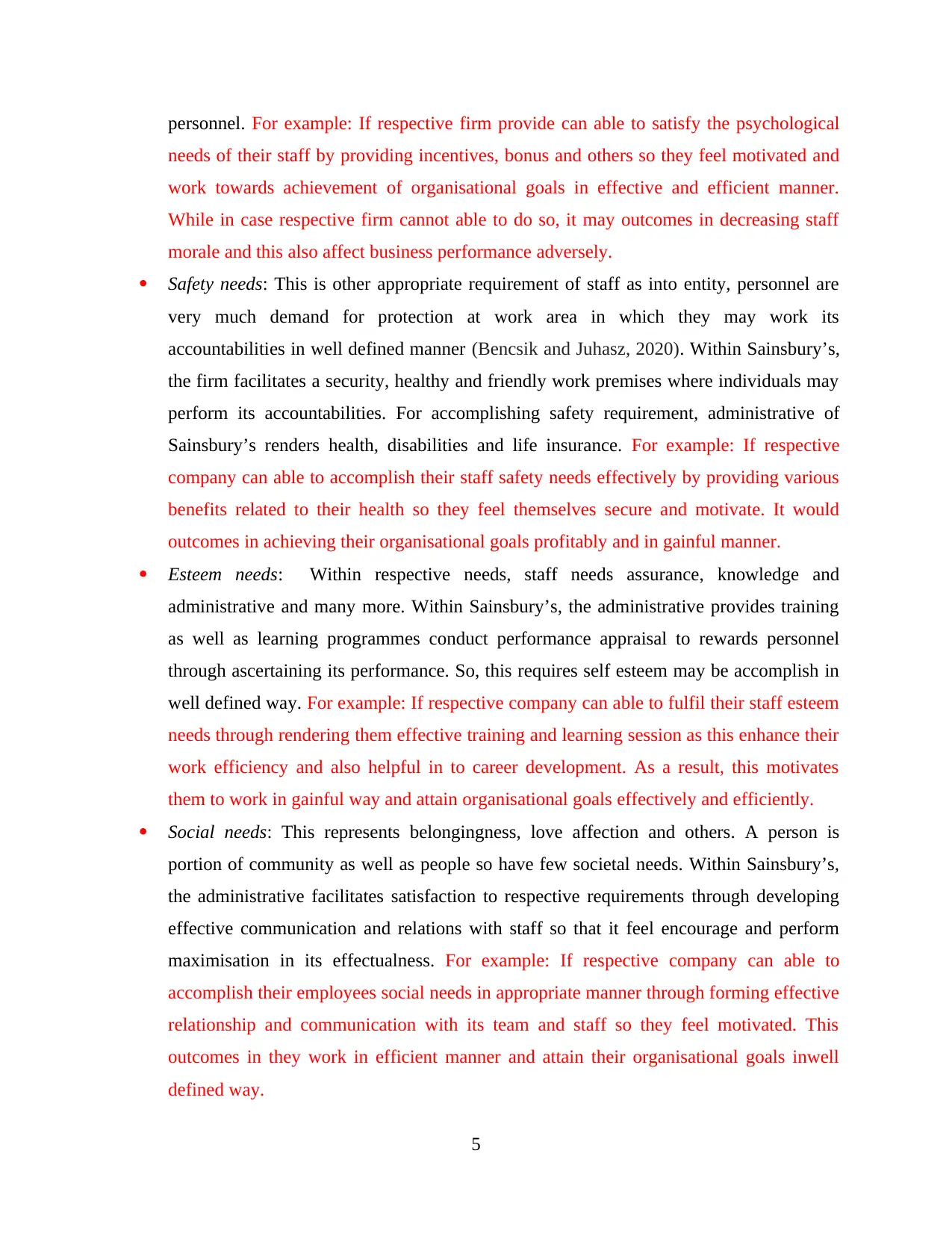
personnel. For example: If respective firm provide can able to satisfy the psychological
needs of their staff by providing incentives, bonus and others so they feel motivated and
work towards achievement of organisational goals in effective and efficient manner.
While in case respective firm cannot able to do so, it may outcomes in decreasing staff
morale and this also affect business performance adversely.
Safety needs: This is other appropriate requirement of staff as into entity, personnel are
very much demand for protection at work area in which they may work its
accountabilities in well defined manner (Bencsik and Juhasz, 2020). Within Sainsbury’s,
the firm facilitates a security, healthy and friendly work premises where individuals may
perform its accountabilities. For accomplishing safety requirement, administrative of
Sainsbury’s renders health, disabilities and life insurance. For example: If respective
company can able to accomplish their staff safety needs effectively by providing various
benefits related to their health so they feel themselves secure and motivate. It would
outcomes in achieving their organisational goals profitably and in gainful manner.
Esteem needs: Within respective needs, staff needs assurance, knowledge and
administrative and many more. Within Sainsbury’s, the administrative provides training
as well as learning programmes conduct performance appraisal to rewards personnel
through ascertaining its performance. So, this requires self esteem may be accomplish in
well defined way. For example: If respective company can able to fulfil their staff esteem
needs through rendering them effective training and learning session as this enhance their
work efficiency and also helpful in to career development. As a result, this motivates
them to work in gainful way and attain organisational goals effectively and efficiently.
Social needs: This represents belongingness, love affection and others. A person is
portion of community as well as people so have few societal needs. Within Sainsbury’s,
the administrative facilitates satisfaction to respective requirements through developing
effective communication and relations with staff so that it feel encourage and perform
maximisation in its effectualness. For example: If respective company can able to
accomplish their employees social needs in appropriate manner through forming effective
relationship and communication with its team and staff so they feel motivated. This
outcomes in they work in efficient manner and attain their organisational goals inwell
defined way.
5
needs of their staff by providing incentives, bonus and others so they feel motivated and
work towards achievement of organisational goals in effective and efficient manner.
While in case respective firm cannot able to do so, it may outcomes in decreasing staff
morale and this also affect business performance adversely.
Safety needs: This is other appropriate requirement of staff as into entity, personnel are
very much demand for protection at work area in which they may work its
accountabilities in well defined manner (Bencsik and Juhasz, 2020). Within Sainsbury’s,
the firm facilitates a security, healthy and friendly work premises where individuals may
perform its accountabilities. For accomplishing safety requirement, administrative of
Sainsbury’s renders health, disabilities and life insurance. For example: If respective
company can able to accomplish their staff safety needs effectively by providing various
benefits related to their health so they feel themselves secure and motivate. It would
outcomes in achieving their organisational goals profitably and in gainful manner.
Esteem needs: Within respective needs, staff needs assurance, knowledge and
administrative and many more. Within Sainsbury’s, the administrative provides training
as well as learning programmes conduct performance appraisal to rewards personnel
through ascertaining its performance. So, this requires self esteem may be accomplish in
well defined way. For example: If respective company can able to fulfil their staff esteem
needs through rendering them effective training and learning session as this enhance their
work efficiency and also helpful in to career development. As a result, this motivates
them to work in gainful way and attain organisational goals effectively and efficiently.
Social needs: This represents belongingness, love affection and others. A person is
portion of community as well as people so have few societal needs. Within Sainsbury’s,
the administrative facilitates satisfaction to respective requirements through developing
effective communication and relations with staff so that it feel encourage and perform
maximisation in its effectualness. For example: If respective company can able to
accomplish their employees social needs in appropriate manner through forming effective
relationship and communication with its team and staff so they feel motivated. This
outcomes in they work in efficient manner and attain their organisational goals inwell
defined way.
5
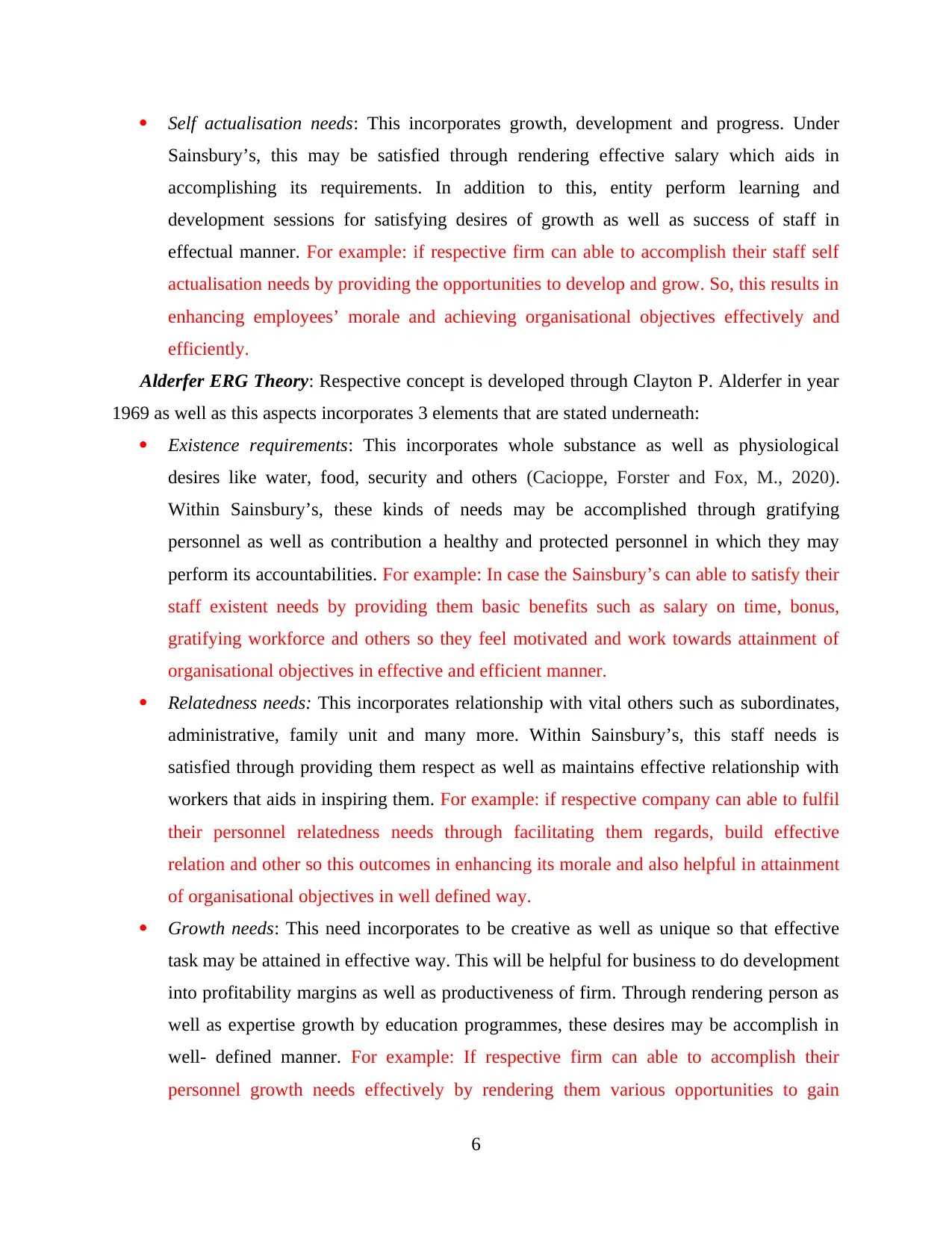
Self actualisation needs: This incorporates growth, development and progress. Under
Sainsbury’s, this may be satisfied through rendering effective salary which aids in
accomplishing its requirements. In addition to this, entity perform learning and
development sessions for satisfying desires of growth as well as success of staff in
effectual manner. For example: if respective firm can able to accomplish their staff self
actualisation needs by providing the opportunities to develop and grow. So, this results in
enhancing employees’ morale and achieving organisational objectives effectively and
efficiently.
Alderfer ERG Theory: Respective concept is developed through Clayton P. Alderfer in year
1969 as well as this aspects incorporates 3 elements that are stated underneath:
Existence requirements: This incorporates whole substance as well as physiological
desires like water, food, security and others (Cacioppe, Forster and Fox, M., 2020).
Within Sainsbury’s, these kinds of needs may be accomplished through gratifying
personnel as well as contribution a healthy and protected personnel in which they may
perform its accountabilities. For example: In case the Sainsbury’s can able to satisfy their
staff existent needs by providing them basic benefits such as salary on time, bonus,
gratifying workforce and others so they feel motivated and work towards attainment of
organisational objectives in effective and efficient manner.
Relatedness needs: This incorporates relationship with vital others such as subordinates,
administrative, family unit and many more. Within Sainsbury’s, this staff needs is
satisfied through providing them respect as well as maintains effective relationship with
workers that aids in inspiring them. For example: if respective company can able to fulfil
their personnel relatedness needs through facilitating them regards, build effective
relation and other so this outcomes in enhancing its morale and also helpful in attainment
of organisational objectives in well defined way.
Growth needs: This need incorporates to be creative as well as unique so that effective
task may be attained in effective way. This will be helpful for business to do development
into profitability margins as well as productiveness of firm. Through rendering person as
well as expertise growth by education programmes, these desires may be accomplish in
well- defined manner. For example: If respective firm can able to accomplish their
personnel growth needs effectively by rendering them various opportunities to gain
6
Sainsbury’s, this may be satisfied through rendering effective salary which aids in
accomplishing its requirements. In addition to this, entity perform learning and
development sessions for satisfying desires of growth as well as success of staff in
effectual manner. For example: if respective firm can able to accomplish their staff self
actualisation needs by providing the opportunities to develop and grow. So, this results in
enhancing employees’ morale and achieving organisational objectives effectively and
efficiently.
Alderfer ERG Theory: Respective concept is developed through Clayton P. Alderfer in year
1969 as well as this aspects incorporates 3 elements that are stated underneath:
Existence requirements: This incorporates whole substance as well as physiological
desires like water, food, security and others (Cacioppe, Forster and Fox, M., 2020).
Within Sainsbury’s, these kinds of needs may be accomplished through gratifying
personnel as well as contribution a healthy and protected personnel in which they may
perform its accountabilities. For example: In case the Sainsbury’s can able to satisfy their
staff existent needs by providing them basic benefits such as salary on time, bonus,
gratifying workforce and others so they feel motivated and work towards attainment of
organisational objectives in effective and efficient manner.
Relatedness needs: This incorporates relationship with vital others such as subordinates,
administrative, family unit and many more. Within Sainsbury’s, this staff needs is
satisfied through providing them respect as well as maintains effective relationship with
workers that aids in inspiring them. For example: if respective company can able to fulfil
their personnel relatedness needs through facilitating them regards, build effective
relation and other so this outcomes in enhancing its morale and also helpful in attainment
of organisational objectives in well defined way.
Growth needs: This need incorporates to be creative as well as unique so that effective
task may be attained in effective way. This will be helpful for business to do development
into profitability margins as well as productiveness of firm. Through rendering person as
well as expertise growth by education programmes, these desires may be accomplish in
well- defined manner. For example: If respective firm can able to accomplish their
personnel growth needs effectively by rendering them various opportunities to gain
6
⊘ This is a preview!⊘
Do you want full access?
Subscribe today to unlock all pages.

Trusted by 1+ million students worldwide
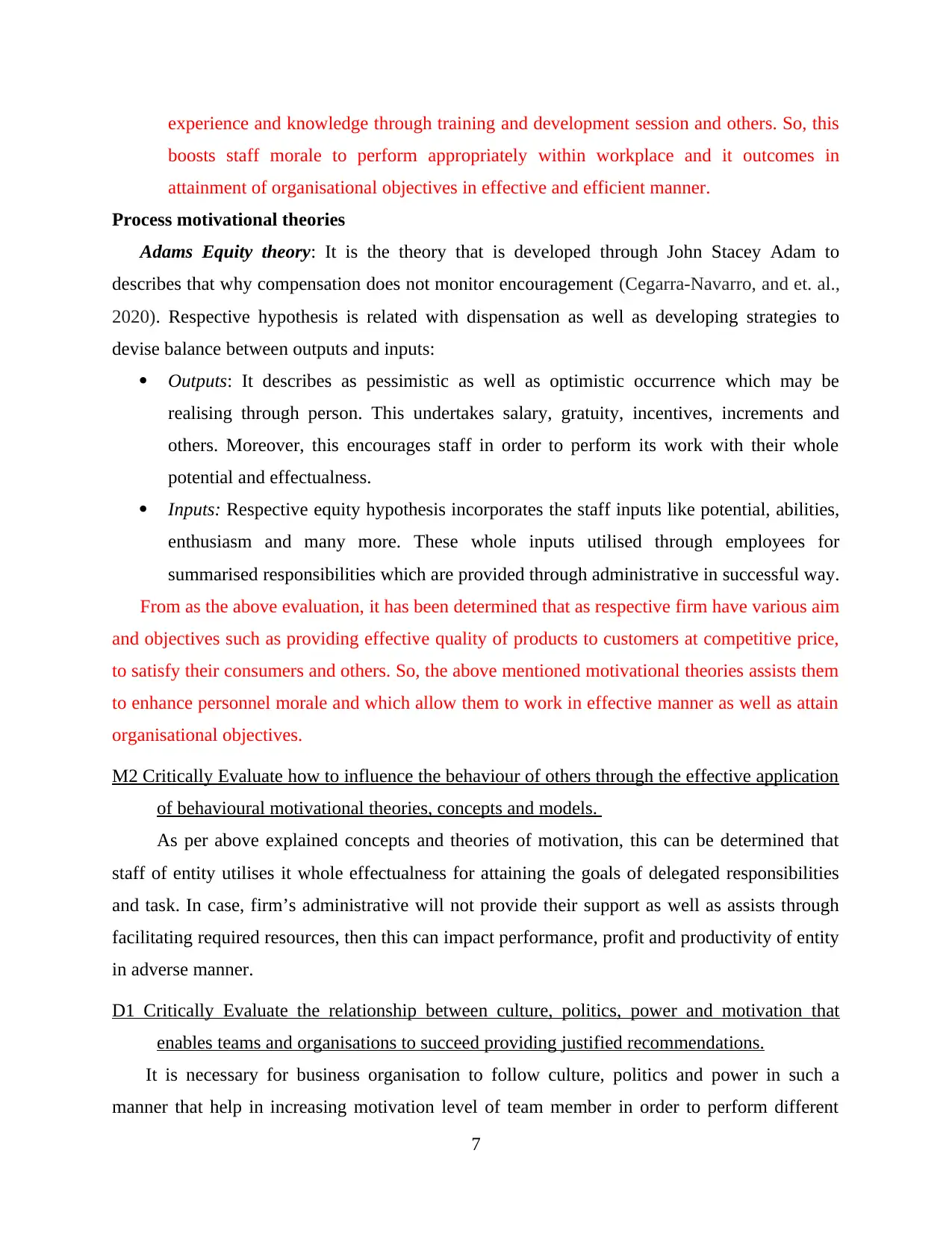
experience and knowledge through training and development session and others. So, this
boosts staff morale to perform appropriately within workplace and it outcomes in
attainment of organisational objectives in effective and efficient manner.
Process motivational theories
Adams Equity theory: It is the theory that is developed through John Stacey Adam to
describes that why compensation does not monitor encouragement (Cegarra-Navarro, and et. al.,
2020). Respective hypothesis is related with dispensation as well as developing strategies to
devise balance between outputs and inputs:
Outputs: It describes as pessimistic as well as optimistic occurrence which may be
realising through person. This undertakes salary, gratuity, incentives, increments and
others. Moreover, this encourages staff in order to perform its work with their whole
potential and effectualness.
Inputs: Respective equity hypothesis incorporates the staff inputs like potential, abilities,
enthusiasm and many more. These whole inputs utilised through employees for
summarised responsibilities which are provided through administrative in successful way.
From as the above evaluation, it has been determined that as respective firm have various aim
and objectives such as providing effective quality of products to customers at competitive price,
to satisfy their consumers and others. So, the above mentioned motivational theories assists them
to enhance personnel morale and which allow them to work in effective manner as well as attain
organisational objectives.
M2 Critically Evaluate how to influence the behaviour of others through the effective application
of behavioural motivational theories, concepts and models.
As per above explained concepts and theories of motivation, this can be determined that
staff of entity utilises it whole effectualness for attaining the goals of delegated responsibilities
and task. In case, firm’s administrative will not provide their support as well as assists through
facilitating required resources, then this can impact performance, profit and productivity of entity
in adverse manner.
D1 Critically Evaluate the relationship between culture, politics, power and motivation that
enables teams and organisations to succeed providing justified recommendations.
It is necessary for business organisation to follow culture, politics and power in such a
manner that help in increasing motivation level of team member in order to perform different
7
boosts staff morale to perform appropriately within workplace and it outcomes in
attainment of organisational objectives in effective and efficient manner.
Process motivational theories
Adams Equity theory: It is the theory that is developed through John Stacey Adam to
describes that why compensation does not monitor encouragement (Cegarra-Navarro, and et. al.,
2020). Respective hypothesis is related with dispensation as well as developing strategies to
devise balance between outputs and inputs:
Outputs: It describes as pessimistic as well as optimistic occurrence which may be
realising through person. This undertakes salary, gratuity, incentives, increments and
others. Moreover, this encourages staff in order to perform its work with their whole
potential and effectualness.
Inputs: Respective equity hypothesis incorporates the staff inputs like potential, abilities,
enthusiasm and many more. These whole inputs utilised through employees for
summarised responsibilities which are provided through administrative in successful way.
From as the above evaluation, it has been determined that as respective firm have various aim
and objectives such as providing effective quality of products to customers at competitive price,
to satisfy their consumers and others. So, the above mentioned motivational theories assists them
to enhance personnel morale and which allow them to work in effective manner as well as attain
organisational objectives.
M2 Critically Evaluate how to influence the behaviour of others through the effective application
of behavioural motivational theories, concepts and models.
As per above explained concepts and theories of motivation, this can be determined that
staff of entity utilises it whole effectualness for attaining the goals of delegated responsibilities
and task. In case, firm’s administrative will not provide their support as well as assists through
facilitating required resources, then this can impact performance, profit and productivity of entity
in adverse manner.
D1 Critically Evaluate the relationship between culture, politics, power and motivation that
enables teams and organisations to succeed providing justified recommendations.
It is necessary for business organisation to follow culture, politics and power in such a
manner that help in increasing motivation level of team member in order to perform different
7
Paraphrase This Document
Need a fresh take? Get an instant paraphrase of this document with our AI Paraphraser
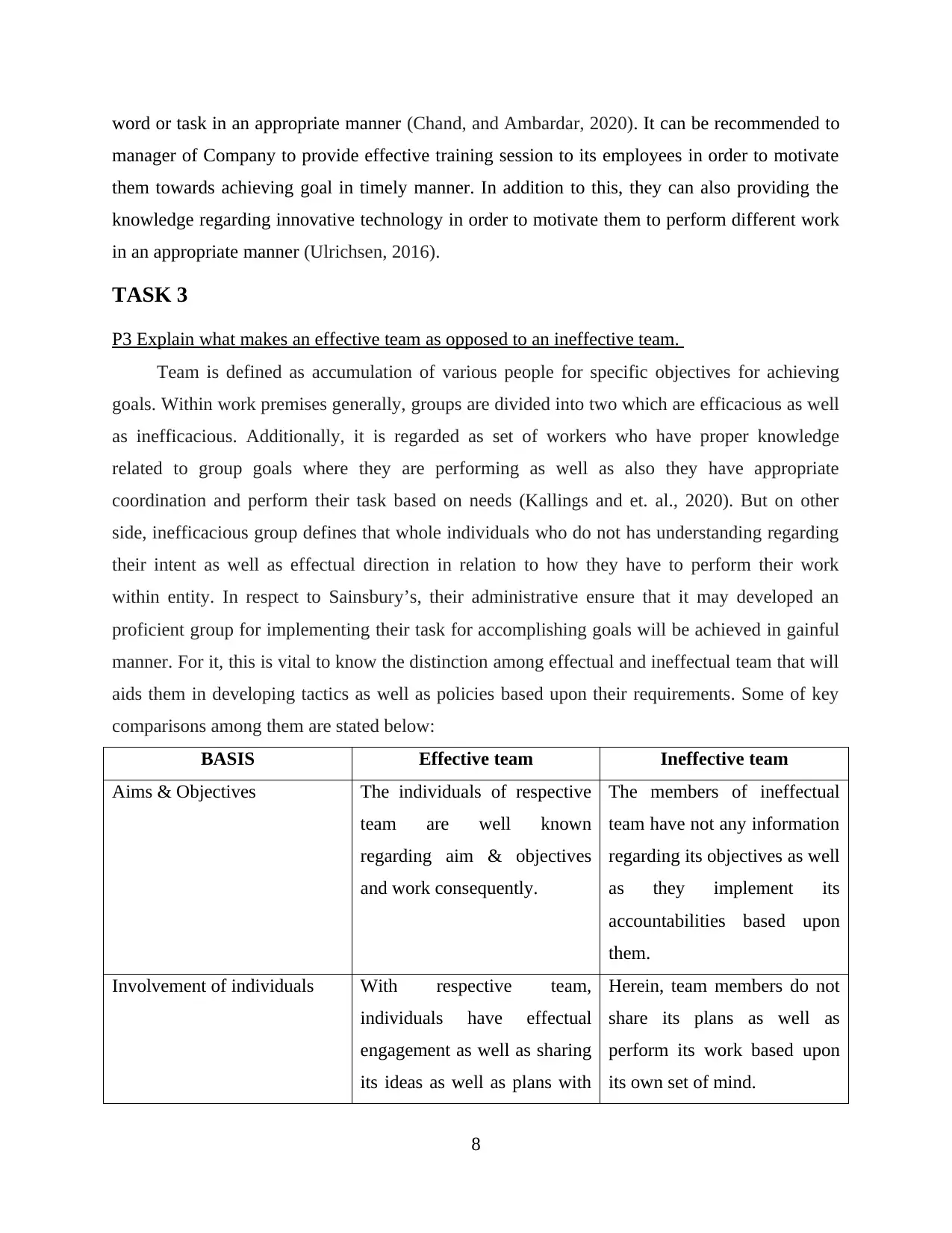
word or task in an appropriate manner (Chand, and Ambardar, 2020). It can be recommended to
manager of Company to provide effective training session to its employees in order to motivate
them towards achieving goal in timely manner. In addition to this, they can also providing the
knowledge regarding innovative technology in order to motivate them to perform different work
in an appropriate manner (Ulrichsen, 2016).
TASK 3
P3 Explain what makes an effective team as opposed to an ineffective team.
Team is defined as accumulation of various people for specific objectives for achieving
goals. Within work premises generally, groups are divided into two which are efficacious as well
as inefficacious. Additionally, it is regarded as set of workers who have proper knowledge
related to group goals where they are performing as well as also they have appropriate
coordination and perform their task based on needs (Kallings and et. al., 2020). But on other
side, inefficacious group defines that whole individuals who do not has understanding regarding
their intent as well as effectual direction in relation to how they have to perform their work
within entity. In respect to Sainsbury’s, their administrative ensure that it may developed an
proficient group for implementing their task for accomplishing goals will be achieved in gainful
manner. For it, this is vital to know the distinction among effectual and ineffectual team that will
aids them in developing tactics as well as policies based upon their requirements. Some of key
comparisons among them are stated below:
BASIS Effective team Ineffective team
Aims & Objectives The individuals of respective
team are well known
regarding aim & objectives
and work consequently.
The members of ineffectual
team have not any information
regarding its objectives as well
as they implement its
accountabilities based upon
them.
Involvement of individuals With respective team,
individuals have effectual
engagement as well as sharing
its ideas as well as plans with
Herein, team members do not
share its plans as well as
perform its work based upon
its own set of mind.
8
manager of Company to provide effective training session to its employees in order to motivate
them towards achieving goal in timely manner. In addition to this, they can also providing the
knowledge regarding innovative technology in order to motivate them to perform different work
in an appropriate manner (Ulrichsen, 2016).
TASK 3
P3 Explain what makes an effective team as opposed to an ineffective team.
Team is defined as accumulation of various people for specific objectives for achieving
goals. Within work premises generally, groups are divided into two which are efficacious as well
as inefficacious. Additionally, it is regarded as set of workers who have proper knowledge
related to group goals where they are performing as well as also they have appropriate
coordination and perform their task based on needs (Kallings and et. al., 2020). But on other
side, inefficacious group defines that whole individuals who do not has understanding regarding
their intent as well as effectual direction in relation to how they have to perform their work
within entity. In respect to Sainsbury’s, their administrative ensure that it may developed an
proficient group for implementing their task for accomplishing goals will be achieved in gainful
manner. For it, this is vital to know the distinction among effectual and ineffectual team that will
aids them in developing tactics as well as policies based upon their requirements. Some of key
comparisons among them are stated below:
BASIS Effective team Ineffective team
Aims & Objectives The individuals of respective
team are well known
regarding aim & objectives
and work consequently.
The members of ineffectual
team have not any information
regarding its objectives as well
as they implement its
accountabilities based upon
them.
Involvement of individuals With respective team,
individuals have effectual
engagement as well as sharing
its ideas as well as plans with
Herein, team members do not
share its plans as well as
perform its work based upon
its own set of mind.
8
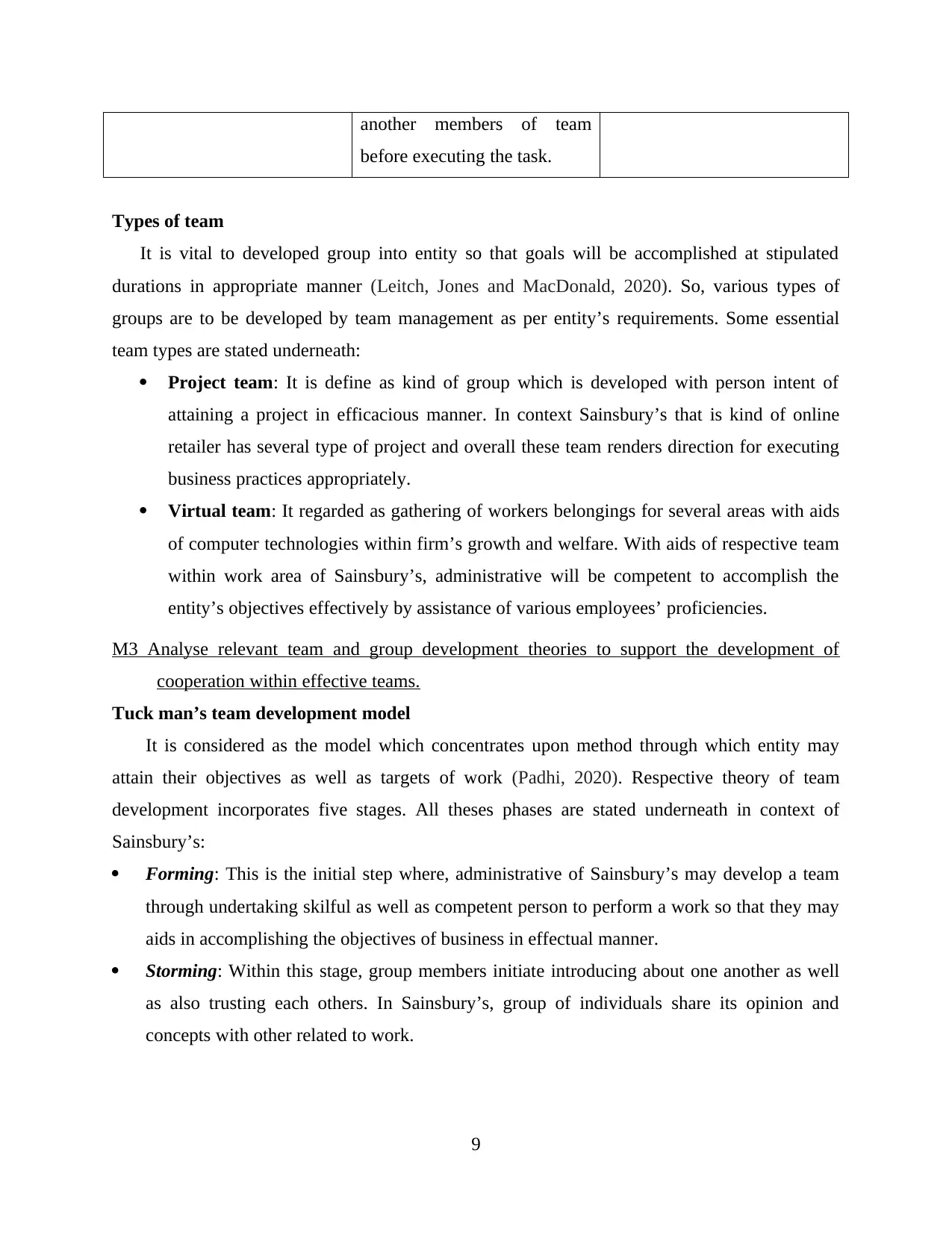
another members of team
before executing the task.
Types of team
It is vital to developed group into entity so that goals will be accomplished at stipulated
durations in appropriate manner (Leitch, Jones and MacDonald, 2020). So, various types of
groups are to be developed by team management as per entity’s requirements. Some essential
team types are stated underneath:
Project team: It is define as kind of group which is developed with person intent of
attaining a project in efficacious manner. In context Sainsbury’s that is kind of online
retailer has several type of project and overall these team renders direction for executing
business practices appropriately.
Virtual team: It regarded as gathering of workers belongings for several areas with aids
of computer technologies within firm’s growth and welfare. With aids of respective team
within work area of Sainsbury’s, administrative will be competent to accomplish the
entity’s objectives effectively by assistance of various employees’ proficiencies.
M3 Analyse relevant team and group development theories to support the development of
cooperation within effective teams.
Tuck man’s team development model
It is considered as the model which concentrates upon method through which entity may
attain their objectives as well as targets of work (Padhi, 2020). Respective theory of team
development incorporates five stages. All theses phases are stated underneath in context of
Sainsbury’s:
Forming: This is the initial step where, administrative of Sainsbury’s may develop a team
through undertaking skilful as well as competent person to perform a work so that they may
aids in accomplishing the objectives of business in effectual manner.
Storming: Within this stage, group members initiate introducing about one another as well
as also trusting each others. In Sainsbury’s, group of individuals share its opinion and
concepts with other related to work.
9
before executing the task.
Types of team
It is vital to developed group into entity so that goals will be accomplished at stipulated
durations in appropriate manner (Leitch, Jones and MacDonald, 2020). So, various types of
groups are to be developed by team management as per entity’s requirements. Some essential
team types are stated underneath:
Project team: It is define as kind of group which is developed with person intent of
attaining a project in efficacious manner. In context Sainsbury’s that is kind of online
retailer has several type of project and overall these team renders direction for executing
business practices appropriately.
Virtual team: It regarded as gathering of workers belongings for several areas with aids
of computer technologies within firm’s growth and welfare. With aids of respective team
within work area of Sainsbury’s, administrative will be competent to accomplish the
entity’s objectives effectively by assistance of various employees’ proficiencies.
M3 Analyse relevant team and group development theories to support the development of
cooperation within effective teams.
Tuck man’s team development model
It is considered as the model which concentrates upon method through which entity may
attain their objectives as well as targets of work (Padhi, 2020). Respective theory of team
development incorporates five stages. All theses phases are stated underneath in context of
Sainsbury’s:
Forming: This is the initial step where, administrative of Sainsbury’s may develop a team
through undertaking skilful as well as competent person to perform a work so that they may
aids in accomplishing the objectives of business in effectual manner.
Storming: Within this stage, group members initiate introducing about one another as well
as also trusting each others. In Sainsbury’s, group of individuals share its opinion and
concepts with other related to work.
9
⊘ This is a preview!⊘
Do you want full access?
Subscribe today to unlock all pages.

Trusted by 1+ million students worldwide
1 out of 18
Related Documents
Your All-in-One AI-Powered Toolkit for Academic Success.
+13062052269
info@desklib.com
Available 24*7 on WhatsApp / Email
![[object Object]](/_next/static/media/star-bottom.7253800d.svg)
Unlock your academic potential
Copyright © 2020–2026 A2Z Services. All Rights Reserved. Developed and managed by ZUCOL.


